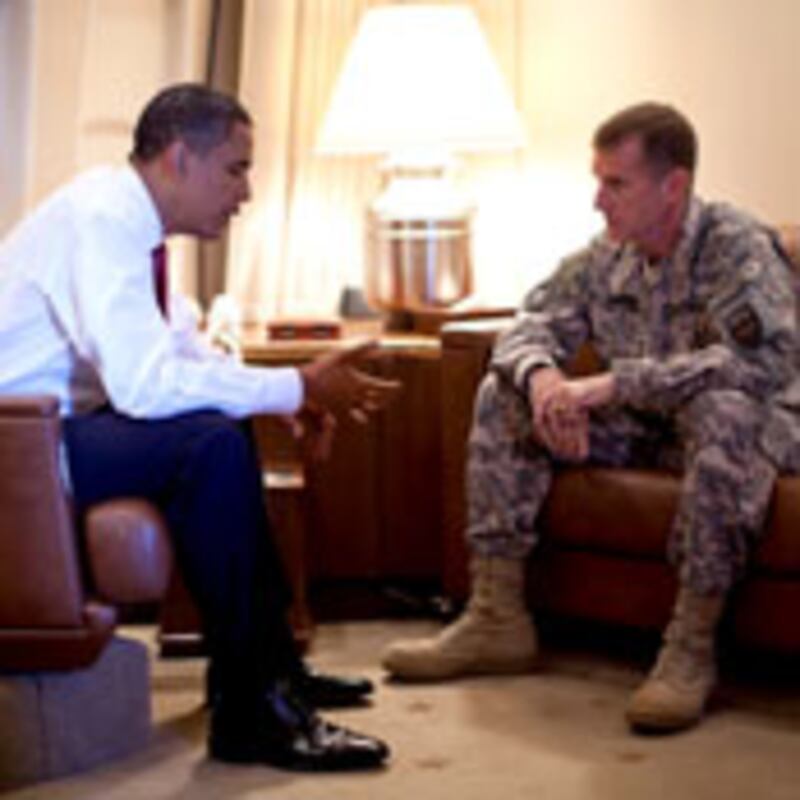
General Stanley McChrystal has given President Obama the opening he needs and—here’s hoping—the opening he’s been waiting for. The breakdown of discipline at the highest levels of U.S. military command is the latest, and perhaps most potent, sign that the American adventure in Afghanistan is already lost. It is one thing for Afghan President Hamid Karzai to treat the White House with contempt, but quite another for McChrystal to do so. And note that the contempt lies less in the locker-room denigrations of the president and vice president than in the deliberate display of snide and puerile disregard. McChrystal knew just what he was doing in allowing a Rolling Stone writer in on the insubordinate spilling of the bile—and, of course, that brazen show is what requires Obama to act.
But what should the president do? He should treat McChrystal’s gaffe like a surprisingly unlocked prison gate and blow through it—out of the prison of America’s misbegotten Afghanistan war, out of the dungeon of Pentagon dominance of U.S. policy. The time for paradigm shift is here, and the rogue general can be its sponsor.
Afghanistan is Obama’s mistake, but McChrystal has been the instrument of that mistake. Now he can be the instrument of its correction.
The dramatic summoning of a war commander to Washington predictably evokes comparisons with the Truman-MacArthur showdown, and it should—but not for the reasons usually cited. Truman’s exercise of authority over MacArthur had far graver stakes that a mere assertion of “civilian control of the military,” for in saying no to MacArthur, Truman was saying no to the wider war with China that the legendary general wanted. Instead, the president chose stalemate. Even more momentously, in refusing MacArthur’s demand for the atomic bomb, Truman put in place the pillar of American Cold War restraint.
• 5 Potential McChrystal Successors • Excerpts from McChrystal’s Rolling Stone interview • More Daily Beast contributors on McChrystal’s futureIn a century defined until then by total war, Truman embraced limited war, accepting that some things are not worth the cost of “victory.” His refusal to allow the use of the atomic bomb when American forces were in danger of being ignominiously forced off the Korean peninsula by a surging Chinese offensive put in place the taboo against atomic use that has prevented its use by any nuclear power ever since. Truman, that is, used the confrontation with MacArthur to absolutely redefine American nuclear strategy. Against the generals, the president was declaring that the A-bomb was not just another weapon. It is transcendent. For historic significance, Truman’s decision not to use the bomb ranks with his earlier decision to use it. MacArthur gave him this opening.
Compared to MacArthur’s desperate hubris, McChrystal’s misdeeds are vulgar and minor, but Obama can elevate the case to the level of his own necessary purpose. Afghanistan is Obama’s mistake, but McChrystal has been the instrument of that mistake. Now he can be the instrument of its correction. Obama can seize the initiative and hit the restart that leads to prompt U.S. withdrawal. The point is, of course, that McChrystal’s behavior is itself a sure signal that the president was wrong both to trust the general’s judgment in the first place and to override his own evident doubt that such a war was ever right or wise. Take the real lesson from Truman: renounce the illusion of victory, accept the shame of stalemate, put the Pentagon on notice. And of course, fire the bastard.
James Carroll's recent book is Practicing Catholic, a story of American belief. He is a columnist for the Boston Globe and Distinguished-Scholar-in-Residence at Suffolk University. His other books include An American Requiem, which won the National Book Award, House of War, winner of the PEN-Galbraith Award, and Constantine's Sword, now an acclaimed documentary.





